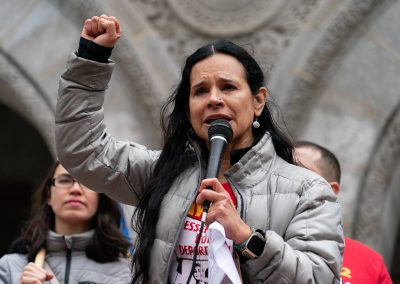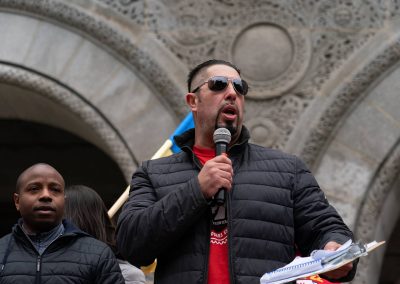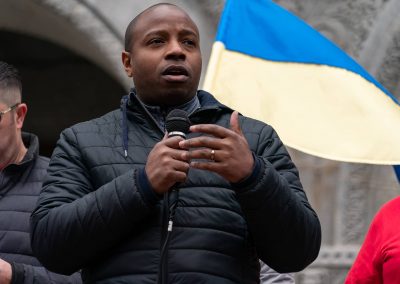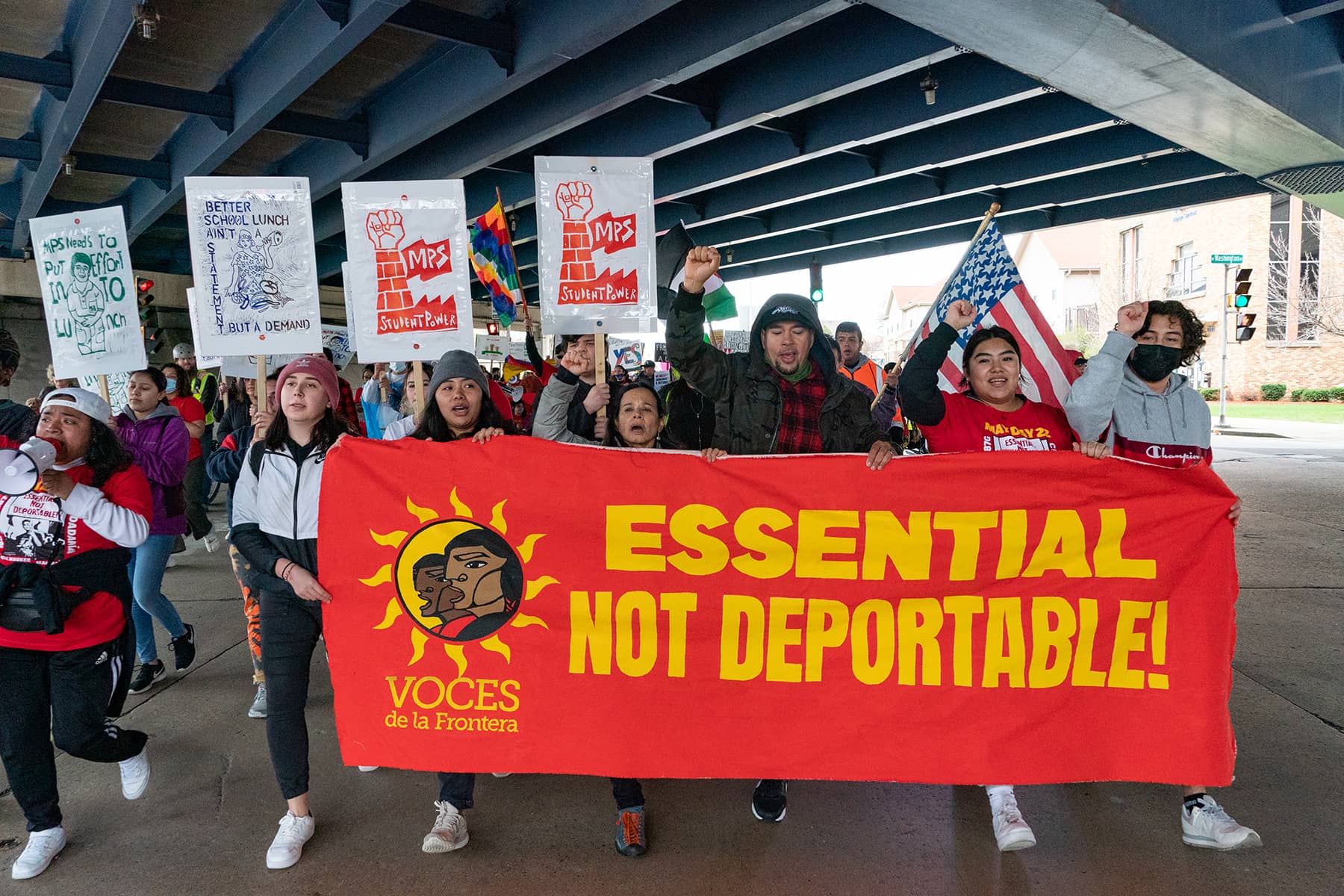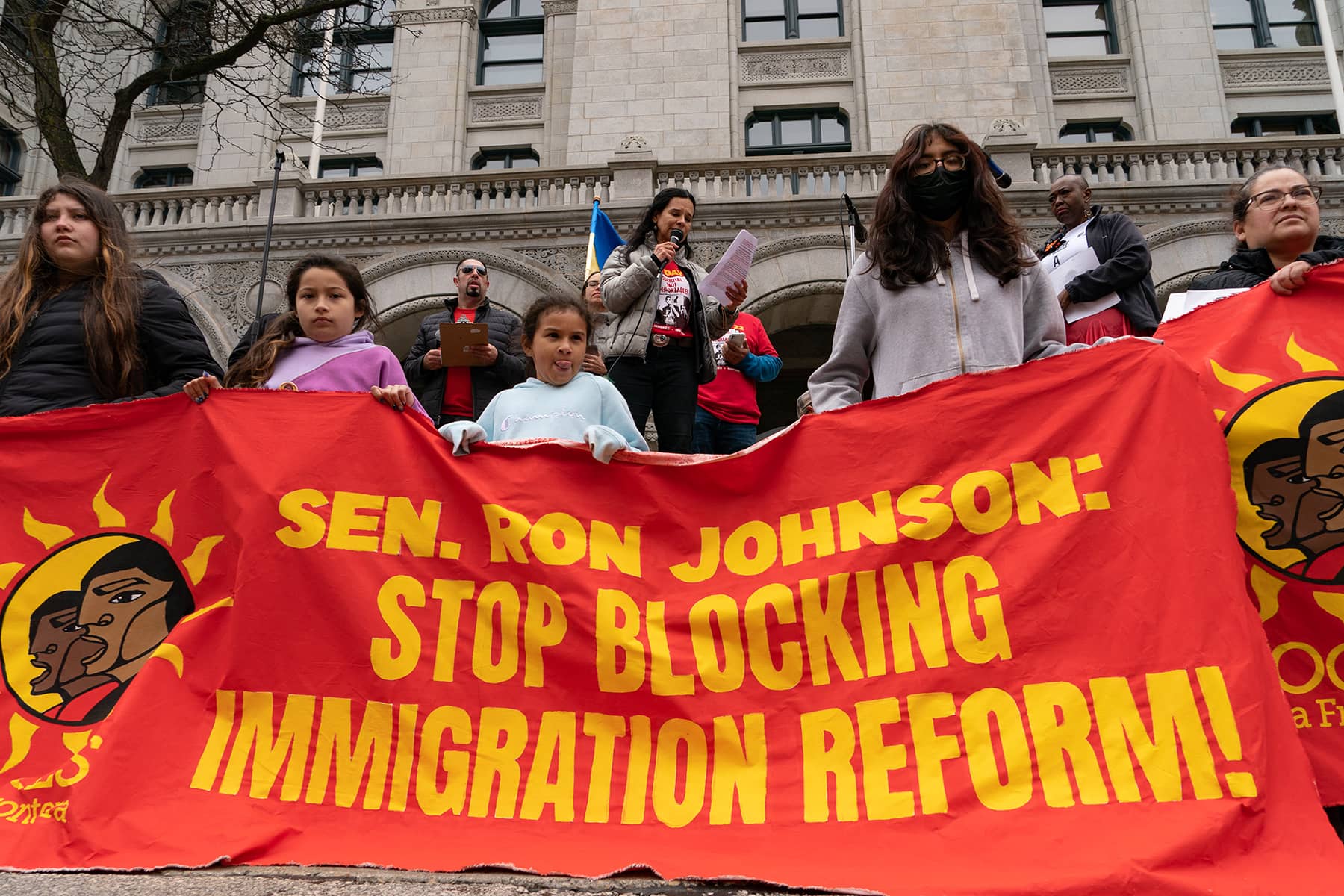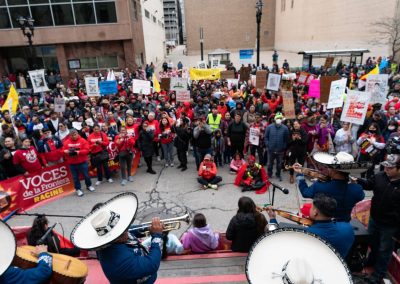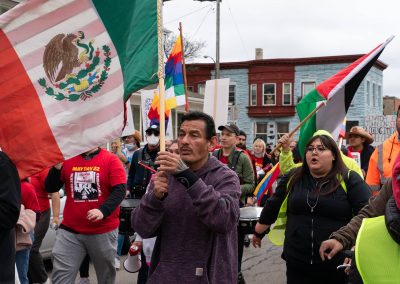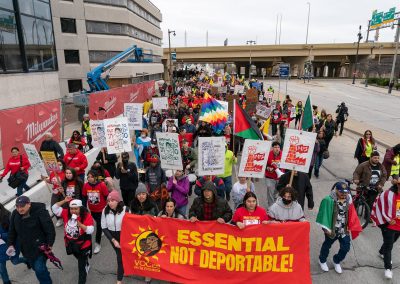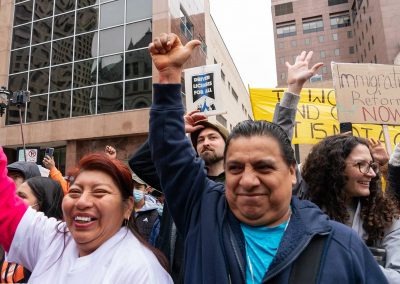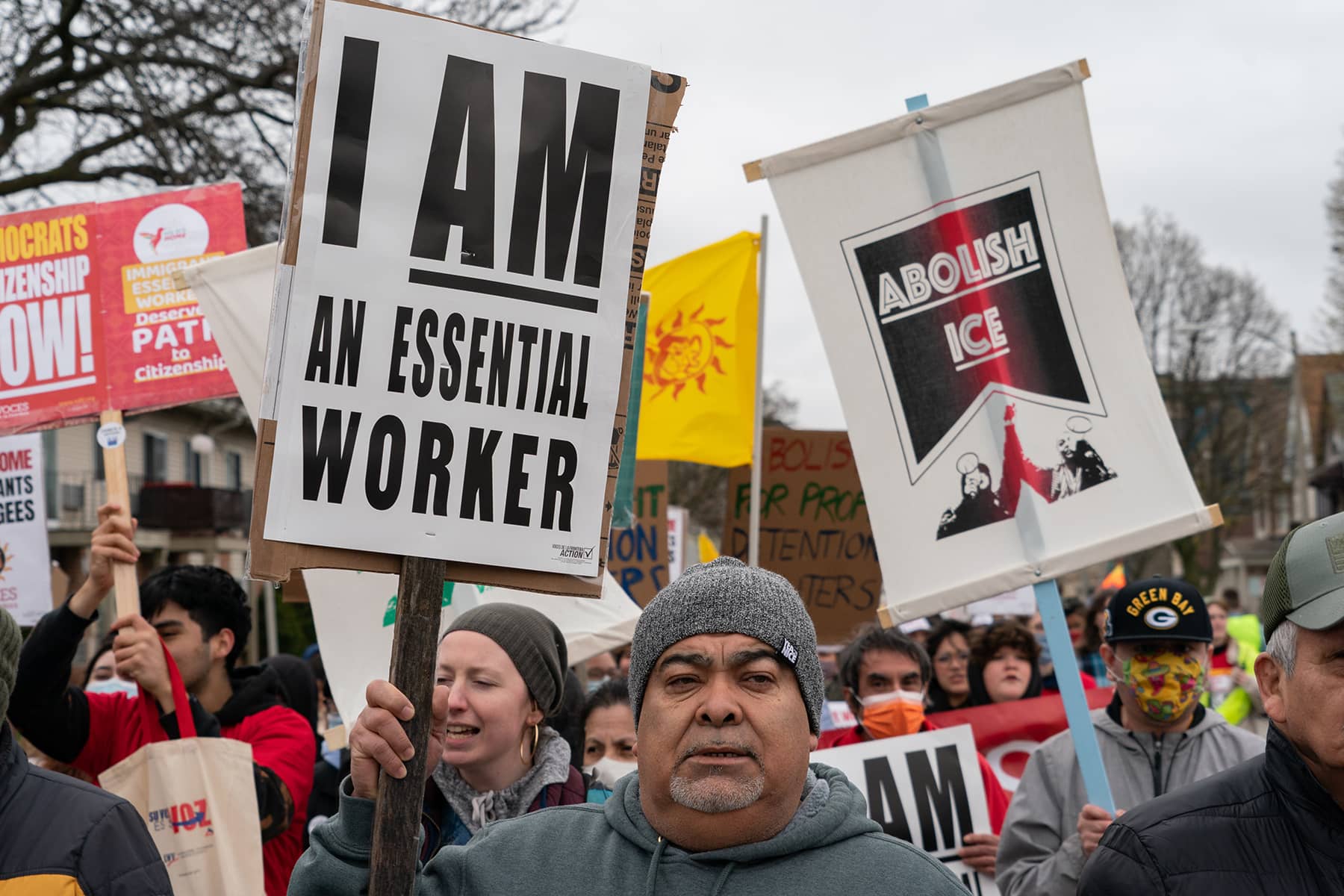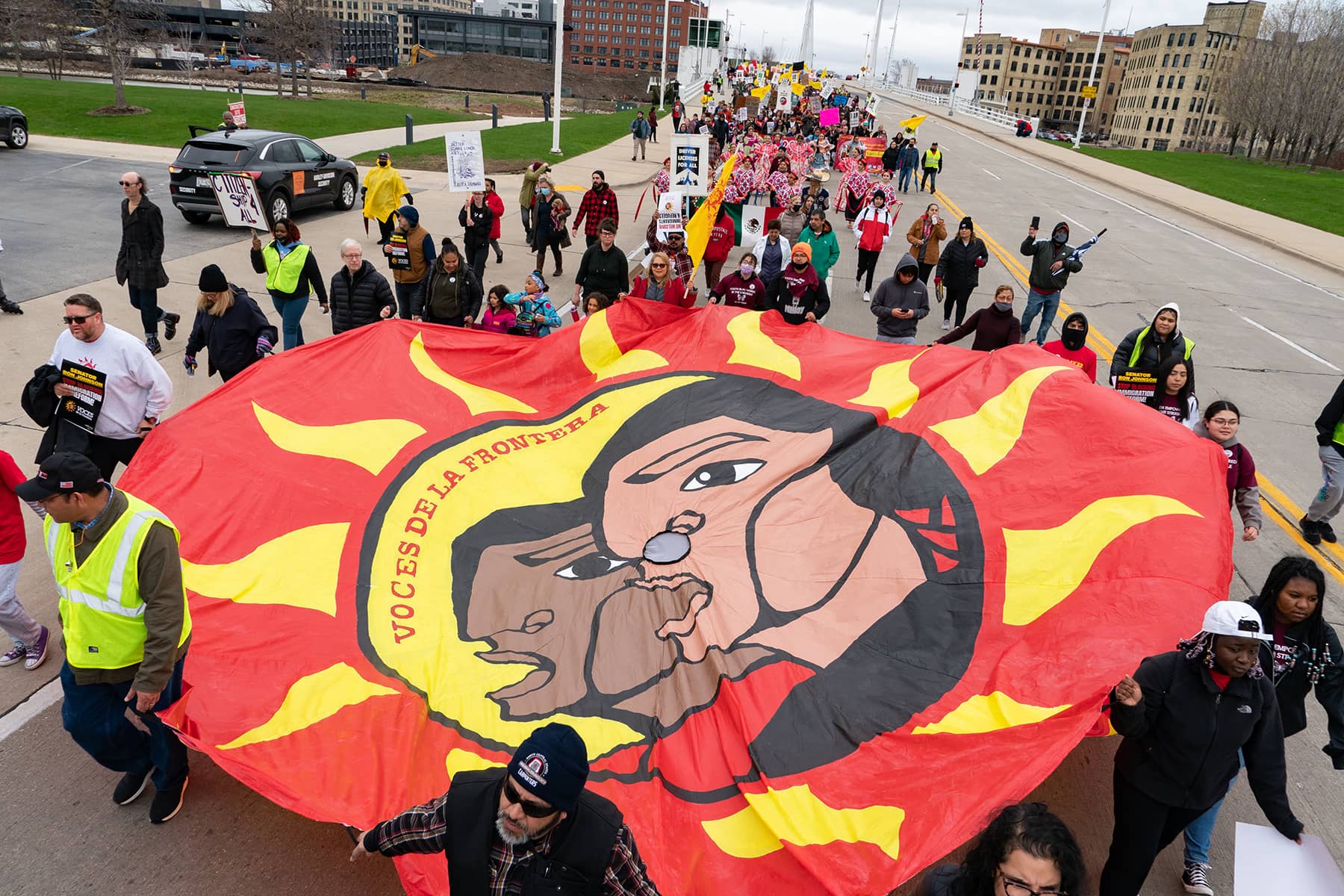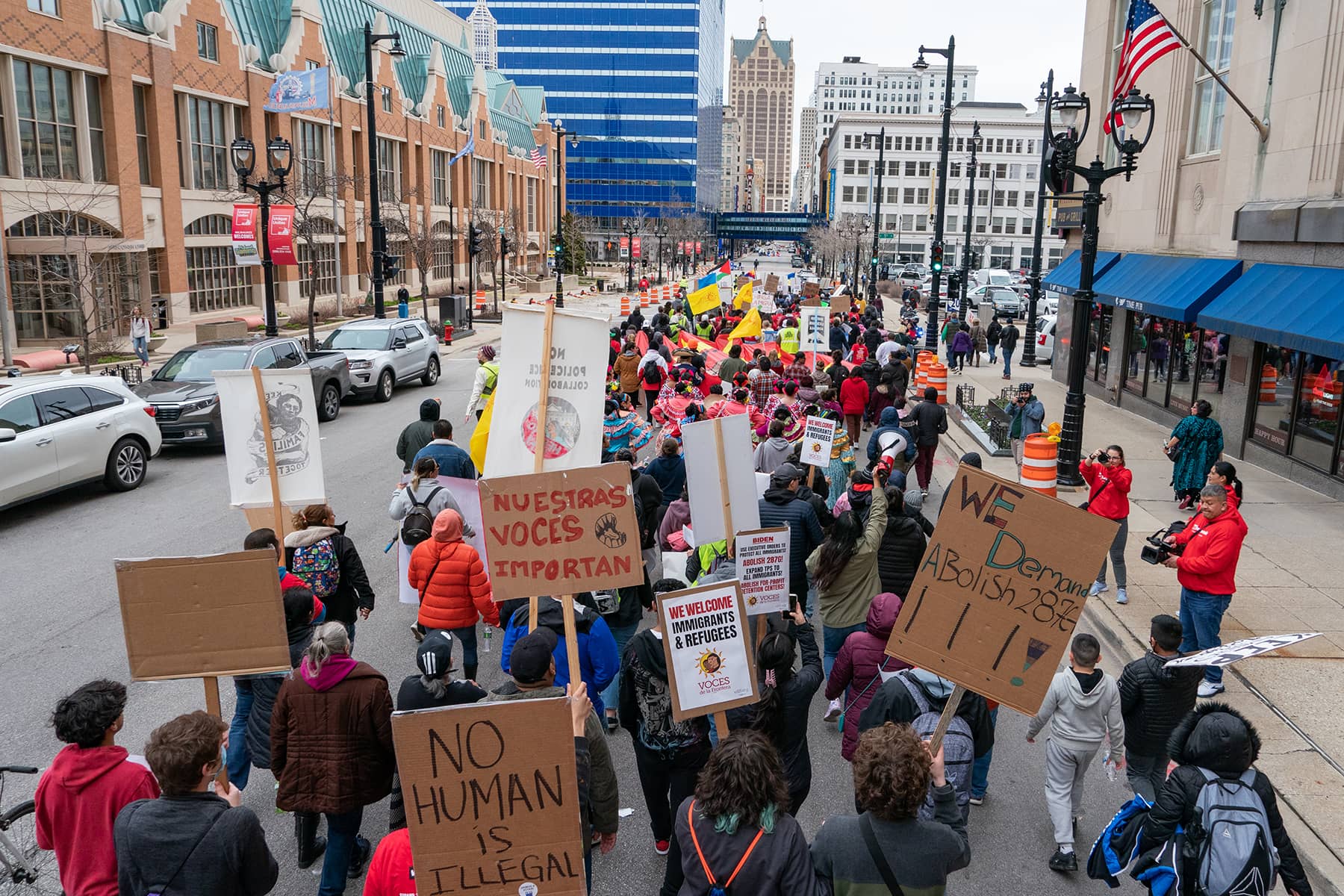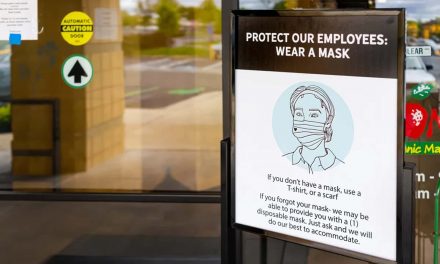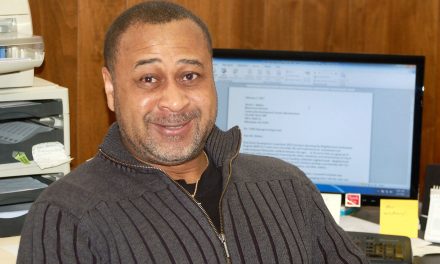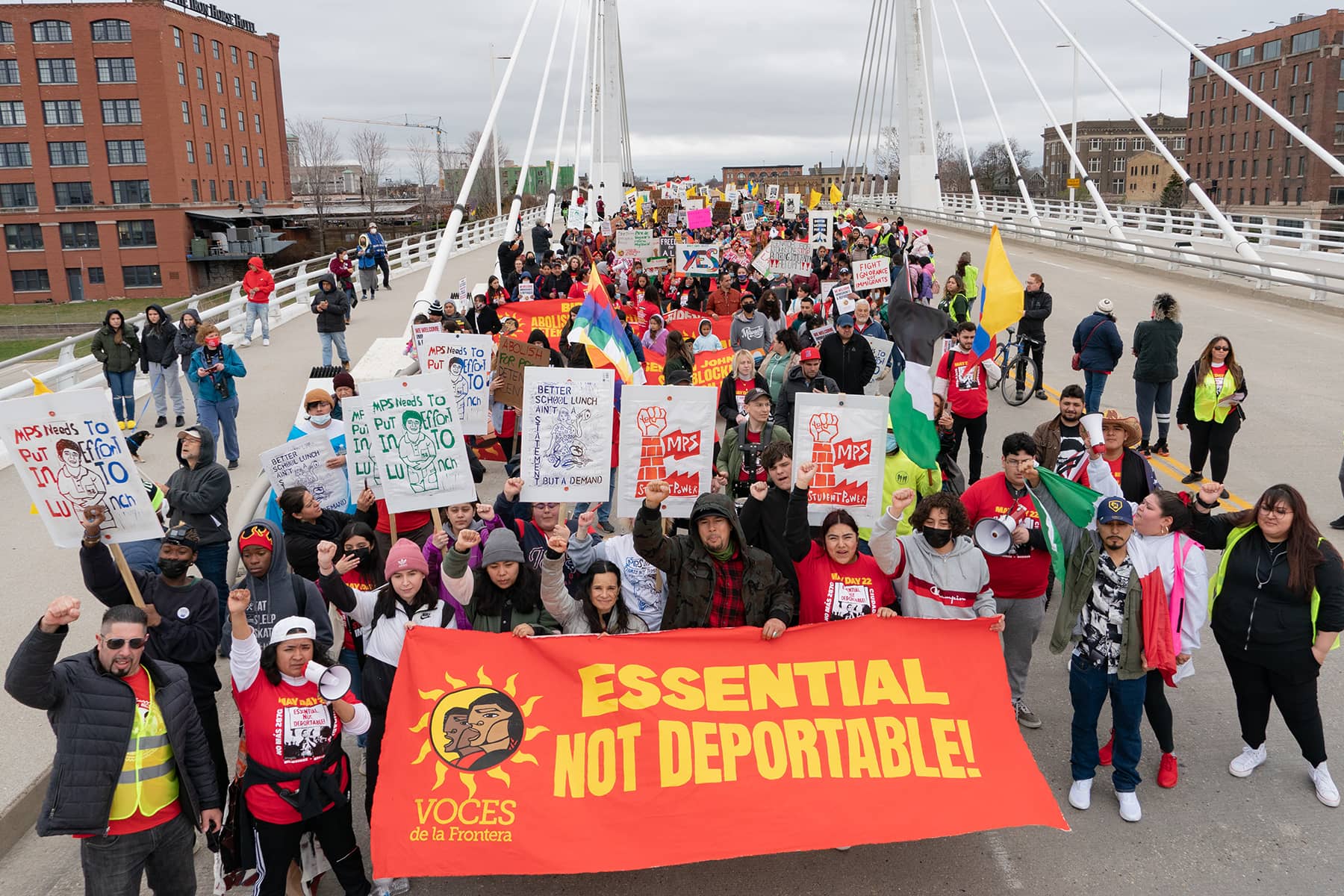
More than 4,000 people assembled on Sunday for an annual May Day march organized by Voces de la Frontera, the immigrant workers’ rights group based in Milwaukee.
The march signaled the start of a two-day series of “Days Without Latinxs & Immigrants” actions in Wisconsin and in 17 other states. Starting on Milwaukee’s South Side, the march trekked north across the 6th Street bridge towards the downtown, ending at the Federal Building.
For years, Voces has organized the May Day march and rally at the Federal Building. On May 1 organizers of the march pointed to Republican Senator Ron Johnson, who has an office in the Federal Building, as a key reason immigration reform failed to pass in Washington DC last year.
Christine Nuemann-Ortiz, executive director of Voces de la Frontera, spoke about months of struggle leading up to that failure. “We were here last year on October 11,” said Nuemann-Ortiz, “in another Day Without Latinxs and Immigrants strike demanding that Johnson vote for immigration reform in Build Back Better in Congress.”
She called out to the crowd gathered outside the Federal Building, “I ask you, did he do it? No, he did not. So we are here to tell Senator Johnson: We see you. We know your shameful record. You have shamelessly enriched yourself while voting against workers and immigrant families. Johnson, we are here to say, and say it with me, ‘Shame on you!’” Nuemann-Ortiz called on President Joe Biden to use executive authority to expand protections for immigrant workers, particularly after broader reform failed last year.
On May 2, immigrant rights activists will travel to Madison to advocate for the restoration of drivers’ licenses and in-state tuition equity for immigrant students. “President Biden described our national efforts to fight COVID-19 and save our families as a war,” said Nuemann-Ortiz, “and we are here to remind him and members of Congress that immigrant workers have been heroes on the frontlines, sacrificing for our well being, and Biden must honor their sacrifices and contributions.”
Milwaukee Mayor Cavalier Johnson, who spoke at the May Day march, emphasized the place immigrants have in the country and city’s identity. “We see ourselves as a nation of immigrants,” said Johnson. “People from all over the world call the city of Milwaukee home, that’s always been one of our greatest strengths. This is why I support comprehensive immigration reform and executive orders to protect all immigrants. …We need to make sure people know that immigrants boost local economies, that they work hard and pay their fair share, that they do contribute to our economic growth in all of our communities. The economic benefits and contributions that immigrants bring benefit everyone in this city and country.”
Israel Peña, who arrived in the U.S. in 2008, is one of those workers. Peña addressed the crowd in Spanish, which was then translated by others on stage.
“I’ve worked in the wineries in California,” said Peña, “and the fields harvesting nuts, almonds, cherries and peaches. I’ve washed cars at a car wash. I’ve worked in construction and in restaurants, and I’m currently working at a manufacturing business here in Wisconsin. In every one of these jobs I’ve put in my best effort and dedication, with the goal of being able to care for my family and contribute to the economy of this great country.”
Peña has supported and been involved in the movement for immigrant rights since 2016, and not without risk. After the march in October, Peña said he was fired from his job for attending. Voces de la Frontera helped him get his job back.
“This is why I’m motivated to continue supporting this organization and marches like this,” said Peña, “demanding that President Biden use his executive power to protect all immigrants and for our legislators in Wisconsin to give us drivers’ licenses, something that the Hispanic community sorely needs.”
Especially following the election of former President Donald Trump in 2016, immigrant rights activists began pushing back against escalating anti-immigrant policies. One such policy authorized the Department of Homeland Security (DHS) to deputize local law enforcement to help with deportation and immigration operations. The Biden administration faces new immigration policy challenges, as it has sought to unravel Trump-era policies and those of former President Barack Obama.
Title 42, which was activated in March 2020 to turn away all asylum seekers at the U.S. border citing the pandemic emergency and the risk of spreading COVID-19, is still in effect, even though Biden promised to end the policy. In late April, a federal judge temporarily blocked Biden’s repeal of Title 42.
What to do about Title 42 has been a hot button issue, including among Democratic candidates for Senate. Outagamie County Executive Tom Nelson, one of the Democratic primary candidates hoping to run against Wisconsin Republican Ron Johnson in the fall, stated in a tweet in late April that, “Title 42 has fueled the border crisis.” He added that “in 2019, 7% of illegal border crossings were repeated crossings. Today, the rate is 27%. Title 42 is a cruel, inhumane policy that has compromised the safety of migrant families and undermined the security of our country.”
Other candidates including Lt. Governor Mandela Barnes, State Treasurer Sarah Godlewski, and Milwaukee Bucks executive Alex Lasry have expressed support for a plan to be offered by the Biden Administration before lifting Title 42. In a statement to Politico Barnes said, “We need to have a plan in place to make sure we’re keeping asylum seekers and people in the U.S. safe before we lift Title 42.”
On April 24, Nelson blasted the reluctance to end the policy. “Dems need to straighten up and get a backbone,” said Nelson, “Embracing a racist Trump immigration policy is shameful — political cowardice of the first order.”
In a statement on April 1, DHS secretary Alejandro Mayorkas said that immigration enforcement will continue even if Title 42 is deactivated. “Let me be clear,” said Mayorkas, “those unable to establish a legal basis to remain in the United States will be removed. We are increasing our capacity to process new arrivals, evaluate asylum requests, and quickly remove those who do not qualify for protection. We will increase personnel and resources as needed and have already redeployed more than 600 law enforcement officers to the border.”
Just days before the May Day march, Nuemann-Ortiz denounced the continuation of Title 42. “All people fleeing dangerous conditions should be welcomed with dignity and given a safe, humane and orderly process to seek asylum,” she said. “We strongly condemn Republicans who are exploiting the desperation of families seeking protection by defending the cruel and discriminatory Title 42, stoking racism and hatred against Black and brown immigrants.” Nuemann-Ortiz also said, “We condemn those Democrats who are shamefully siding with Republicans and caving into the politics of hate and fear by defending Title 42.”
Karina Tweedell, a Ukrainian immigrant who arrived in 2007, confronted what she called a double standard in U.S. immigration policy while speaking at the May Day rally on May 1.
“Today especially, I’m acutely aware of my privilege to be in safety, to have my needs met, to speak freely, and to be heard,” said Tweedell, whose family relocated to Milwaukee to escape Russian aggression in 2014. “As we speak, millions of people in my home country are not afforded this opportunity due to unprovoked violence inflicted by Russia. Yet also millions of people here in the U.S. don’t have access to health care, education, and equal pay.”
When she arrived the the U.S. in 2007, Tweedell recalls her father telling her to assimilate. “I thought if I sound, look, and act like the Americans surrounding me in small-town Indiana, that would help me succeed in life. Frankly, it did, and that’s the problem,” she said. We are all worthy of being treated with dignity regardless of where we came from or who we are. Instead of adjusting to a system that’s broken, we need to adjust the system.”
Tweedell called for Title 42 to be repealed, and for people to extend their sympathies to all refugees, not just Ukrainians. “One shouldn’t have a certain passport to have access to basic human rights, a certain look for their life to matter,” she said. “It’s easy to dismiss another human’s pain when you think they aren’t like you — those people in other countries, those children not in our neighborhoods, those workers speaking a different language. I’m here to say it loudly, people seeking asylum, regardless of where they came from, deserve our protection.”
Isiah Holmes
Joe Brusky, Dusan Harminc, and Jessica Schmidt
Originally published on the Wisconsin Examiner as May Day march shows immigrant rights movement isn’t over
Donate: Wisconsin Examiner
Help spread Wisconsin news, relentless reporting, unheard voices, and untold stories. Make a difference with a tax-deductible contribution to the Wisconsin Examiner

